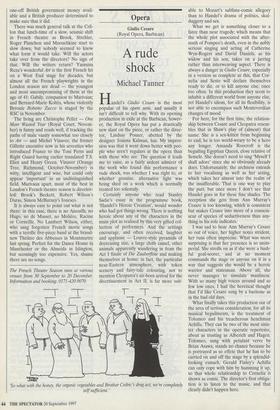Opera
Giulio Cesare (Royal Opera, Barbican)
A rude shock
Michael Tanner
Handel's Giulio Cesare is the most popular of his opere serie, and usually it isn't difficult to tell why. With its opening production in exile at the Barbican, howev- er, the Royal Opera has put a drastically new slant on the piece, or rather the direc- tor, Lindsay Posner, abetted by the designer Joanna Kalman, has. My impres- sion was that it went down better with peo- ple who aren't regulars at the opera than with those who are. The question it leads me to raise, as a fairly ardent admirer of the work who found this performance a rude shock, was whether I was right to, or whether genuine, alternative light was being shed on a work which is normally treated too solemnly.
Certainly anyone who read Stanley Sadie's essay in the programme book, 'Handel's Heroic Creation', would wonder who had got things wrong. There is nothing heroic about any of the characters in the main plot as realised by this very gifted col- lection of performers. And the settings encourage, and often received, laughter and applause — Louvre-style pyramids of decreasing size, a large cloth camel, other animals apparently wandering in from the Act I finale of Die Zauberflote and making themselves at home: in fact, the particular near-Eastern atmosphere, with token scenery and fairy-tale colouring, not to mention Cleopatra's air-born arrival for the divertissement in Act II, is far more suit- able to Mozart's sublime-comic allegory than to Handel's drama of politics, skul- duggery and sex.
What we get is something closer to a farce than near tragedy; which means that the whole plot associated with the after- math of Pompeo's death, even in the nobly serious singing and acting of Catherine Wyn-Rogers and David Daniels, as his widow and his son, takes on a jarring rather than interweaving aspect. There is always a danger in Giulio Cesare, especially in a version as complete as this, that Cor- nelia and Sesto will declare themselves ready to die, or to kill anyone else, once too often. In this production they seem to inhabit a different world from anyone else, yet Handel's idiom, for all its flexibility, is not able to encompass such Monteverdian changes of mood.
For here, for the first time, the relation- ship between Cesare and Cleopatra resem- bles that in Shaw's play of (almost) that name. She is a sex-kitten from beginning to end, he is too world-weary to be a hero any longer. Amanda Roocroft is the beguiling Egyptian Queen, close relative of Semele. She doesn't need to sing 'Myself I shall adore' since she so obviously already does. Unfortunately, the archness extends to her vocalising as well as her acting, which takes her almost into the realm of the insufferable. That is one way to play the part, but once more I don't see that Handel goes in for these fine shades. The reception she gets from Ann Murray's Cesare is too knowing, which is consistent but makes Cesare into more of a connois- seur of species of seductiveness than any- thing in his role indicates.
I was sad to hear Ann Murray's Cesare so out of voice, her higher notes strident, her runs often imprecise. What was more surprising is that her presence is so unim- penal. She strolls on as if she were a bash- ful goal-scorer, and at no moment commands the stage or anyone on it in a way that suggests she would be a heroic warrior and statesman. Above all, she never manages to simulate manliness. With so many high voices around and so few low ones, I had the heretical thought that I'd like Cesare sung by a baritone as in the bad old days.
What finally takes this production out of the area of serious consideration, for all its musical beguilments, is the treatment of Tolomeo and his treacherous henchman Achilla. They can be two of the most sinis- ter characters in the operatic repertoire, about as trusting as Alberich and Hagen. Tolomeo, sung with petulant verve by Brian Asawa, stands no chance because he is portrayed as so effete that he has to be carried on and off the stage by a splendid- looking eunuch. Gerald Finley's Achilla can only cope with him by hamming it up, so that whole relationship to Cornelia is shown as comic. The director's first obliga- tion is to listen to the music, and that clearly didn't happen here.


































































 Previous page
Previous page